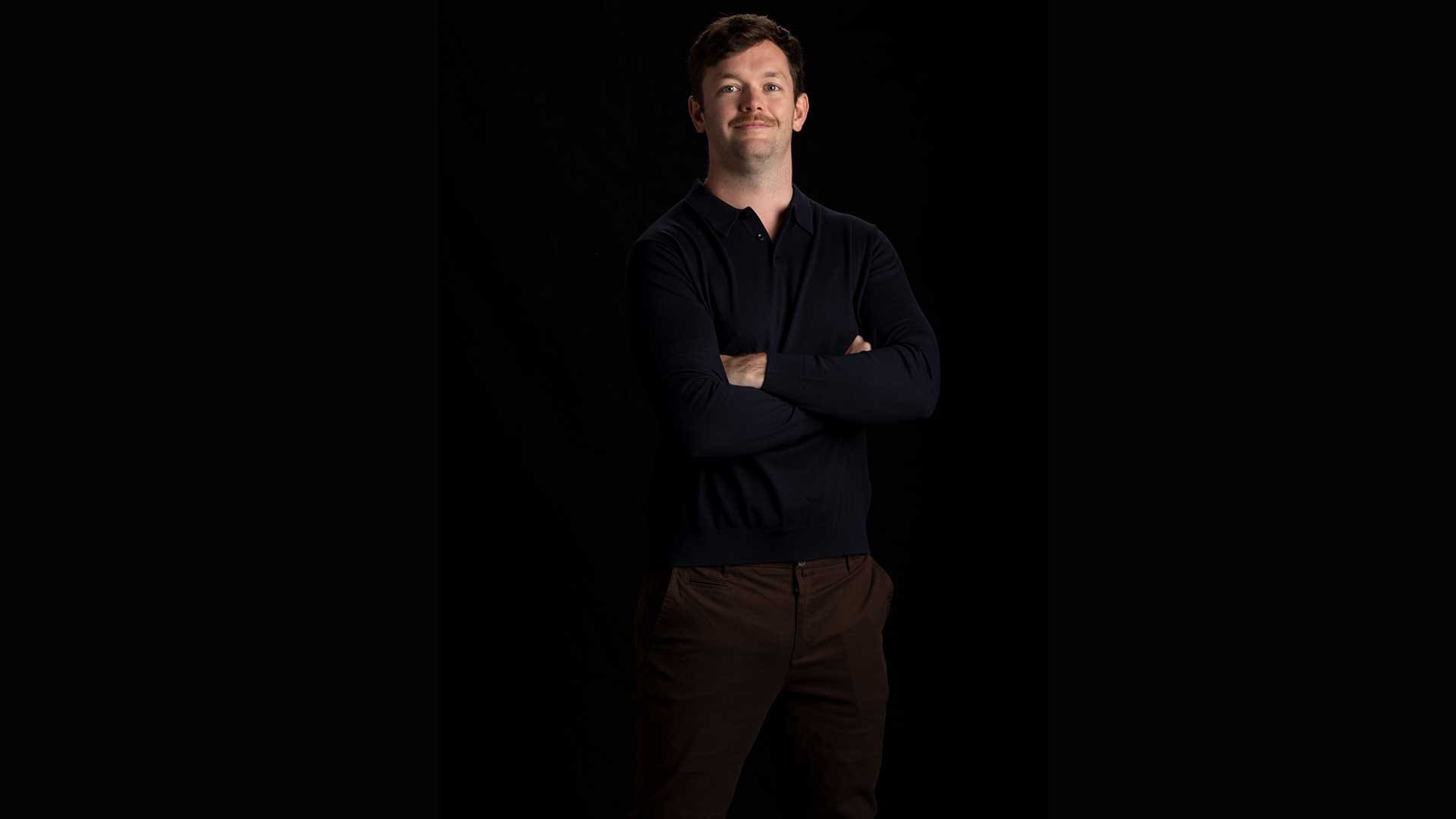Silky Insights Concrete Action
Chris Matthews wears:
Emil Navy Long Sleeve Knitted Polo $299 (KPMI004)
Dougie Chocolate Chino $199 (PCW005) From Working Style
AI mania has swept its way through every sector and has quickly become one of the defining technologies of the 21st century, already apparently reshaping industries and redefining how businesses operate globally. Amidst all the buzz, Sam Altman sound bites, Nvidia share price shifts and all the other noise, actually getting tangible examples of how you can leverage AI to deliver clear and immediate value for your business remains surprisingly rare. Many of us are still trying to figure out how to get off the starting blocks and how best to start to integrate AI effectively, let alone being paralysed by fears around complexity and security.
On a mission to cut through the noise and the fear is Silky Insights, a New Zealand-based AI firm built on the basis of practicality, innovation, and results. Founders Chris Matthews and Luke Doyle, focus on transforming raw technology into solutions that businesses can genuinely use. “There’s more risk in not adopting AI now,” Matthews Suggests. “The real challenge is not AI itself, but getting companies to understand that the risk of inactivity outweighs the risk of adoption.”
Silky Insights’ approach is a kind of down-to-earth and pragmatic innovation, focusing less on the theoretical potential of artificial intelligence and more on the immediate, measurable impacts it can deliver. “AI advice is easy to give. But we don’t want to just tell businesses they need AI, we build the solutions they need.” Says Matthews. It’s this philosophy of practical application that guides every project they undertake.
Born from an unlikely spark of inspiration, a fascination with a Game of Thrones-inspired NLP tool, Matthews and Doyle saw early on that AI could revolutionise industries far beyond entertainment. “Luke sent me this page and said, ‘Check this out, this is insane,’” Matthews remembers. “You could ask a question and it would give you a human-like answer. That’s when we realised that AI was going to change everything, and we wanted to be part of that.”
Matthews and Doyle both have roots in mechanical engineering, having met as students at the University of Canterbury “We both did mechanical engineering there. It’s a really good degree that’s pretty multifaceted. And I don’t think either of us ever used any specific part of our degree directly in our real jobs, but what the degree taught us about problem-solving has been invaluable.” Says Matthews.
While at Canterbury, Doyle’s passion for software development emerged early on. “I was doing coding problems instead of studying for my tests,” Doyle laughs. Meanwhile, Matthews explored consulting and business strategy, honing his natural talents for identifying market opportunities.
Their complementary skill sets soon proved the perfect business match. Doyle, with his deep technical knowledge, excels at crafting complex AI systems. Matthews, with his strategic insight, digs into client needs and translates Doyle’s technical innovations into practical, sellable solutions. They are like the Starksy and Hutch of the AI world. “Luke’s the chief technology officer. He’s the guy who understands AI to the nth degree. My role is to take Luke’s cool technology ideas and find the business problems they solve.”
Initially, Matthews and Doyle envisioned a platform to connect businesses with expert consultants, enhanced by AI technology (kind of an AirBNB for business consultancy) but they soon realised the real opportunity lay not in consultancy but directly in the AI itself. “The excitement wasn’t about connecting professionals with businesses, it was about the AI.” Recalls Matthews. This realisation pivoted their business to focus primarily on custom AI solutions.
Matthews and Doyle and take a hands-on approach has surprised some potential clients, who find it unusual yet appealing that Silky prefers to build first and charge later.
As part of Silky Insights’ business philosophy they intentionally steer clear of becoming tied to a single AI platform or provider, “We’re at the start of an AI horse race. You don’t necessarily want to back the first horse.” Says Matthews. Doyle expands on this: “Every day, new papers are coming out, and new open-source models are emerging. It’s a full-time job just to stay up to date.”
An exciting new area of their work is structuring qualitative data. They employ advanced retrieval systems like HippoRAG, which mimics human memory by organising data conceptually. Doyle explains, “It’s about context, making AI think more like humans do, understanding relationships implicitly rather than explicitly.” Being able to leverage the latest techniques due to this deep founder domain obsession helps to set Silky Insights apart but they are particularly proud of what this actually means for clients at the end of the day.
An exciting example of this hands-on approach is their collaboration with Humaneer, a company shaking up the HR industry by using AI to supercharge HR Pros. Humaneer has a bold vision: where HR professionals have the freedom to lead, innovate, and shape the future of work. Mak by Humaneer supports HR pros to say goodbye to hours of admin and paperwork. “They weren’t just after automation for automation’s sake they wanted something that could actually help HR professionals make better decisions, faster,” says Matthews.

Silky Insights took Humaneer’s existing SaaSplatform that includes an HR Native meeting space and layered on additional advanced AI capabilities leveraging natural language processing, retrieval-augmented generation, and knowledge base integration. Supercharging the platform, the system does more than just summarise, it actively partners with the user. The meeting space delivers HR outputs, insights, emerging themes and seamlessly connects discussions to current best practices and region-specific compliance across New Zealand and Australia. Users can instantly generate HR documents from their meetings with over 50 specialised options (and counting). Users can also get real-time HR advice, guidance, and tailored templates exactly when they need them. All of this is backed by the lived expertise of Humaneer’s founders, who collectively bring over 60 years of hands-on HR experience.“Chris and Luke are a powerhouse duo who have an amazing complementary set of skills. Already we have seen a huge difference in what we are technically delivering to our customers with Mak (Humaneers AI productivity partner), and what makes these guys truly special to work with, is how naturally they tune into our vision, the roadmap, and our commercial goals. They help us as cofounders to turn big ideas into a reality. We deeply trust them to run alongside us, challenge us, guide us and they are the guys who always remind us to pause and look back on just how far we have come.”
The impact has been immediate and exciting. Instead of wading through dense meeting notes, searching and scrolling through regulatory HR sites to find answers or worrying about compliance blind spots, HR teams using Humaneer now receive intelligent, contextual outputs they can instantly use. Doyle explains, “We’re not just interpreting the conversation we’re delivering value from it. And the potential to white-label this for other industries beyond HR is massive.” Matthews adds, “We helped them move faster, think long-term, and build better. From product guidance to beta testing to roadmap planning, it’s been a fantastic working relationship.”
Despite their tangible successes, Matthews and Doyle frequently encounter common misconceptions about AI within the industry. “Businesses often assume AI can immediately solve any problem effortlessly, without realising the critical role of high-quality, well-prepared data.” Says Matthews. “The reality is, AI’s effectiveness heavily depends on the quality of data available. Much of our initial work involves extensive data cleaning and structuring before the AI can even start providing value.” Adds Doyle.
Another prevalent misunderstanding is the fear of AI replacing human jobs. “Our experience has shown that AI isn’t about replacing jobs, it’s about enhancing human capabilities. AI handles repetitive, mundane tasks, allowing professionals to focus on higher-value activities.” Says Doyle. “We regularly need to educate clients about the true nature of AI’s impact on their workforce, helping them see AI as an empowering tool rather than a threat.” Says Matthews.
Different industries also demonstrate varying levels of readiness and adaptability when it comes to AI integration. Matthews notes the distinct differences: “Industries like finance and technology often embrace AI quickly because they deal heavily with structured data and are accustomed to rapid innovation cycles. In contrast, sectors like energy and healthcare face stricter regulatory environments and traditionally slower technology adoption rates.” Doyle highlights how Silky Insights tailors their approach accordingly, “Understanding these sector-specific nuances is critical. We work closely with our clients to navigate regulatory frameworks, ensuring our AI solutions align seamlessly with compliance and operational requirements.”
New Zealand businesses, Matthews observes, are particularly cautious in adopting AI, a hesitation driven partly by misconceptions and partly by a conservative approach to technological risk. “New Zealand companies often prefer to watch others adopt new technologies before jumping in themselves,” Matthews says. Doyle adds further context: “Compared to Australia and other global markets, New Zealand businesses can be slower to embrace AI, partly due to fewer competitive pressures and a smaller scale of operations.”
In contrast, Matthews points to Australia as having a more proactive stance: “Australian businesses often operate under stronger competitive pressures, making rapid adoption of innovative technologies like AI critical for maintaining competitive advantages.” He emphasises the urgent need for New Zealand businesses to overcome our hesitancy, cautioning that delay could lead to significant competitive disadvantages as global competitors quickly integrate AI solutions.
Despite this both founders are optimistic about the opportunities for New Zealand businesses. “New Zealand businesses are agile and innovative by nature. Once they see AI’s potential clearly, they can quickly leverage it to create significant competitive advantages.” Says Doyle. “The potential for New Zealand businesses is massive, but the window to take advantage is narrowing rapidly. The time to act is now.” Adds Matthews.
Looking to the future, Matthews and Doyle see immense potential in how AI might evolve over the next 5 to10 years. Doyle anticipates rapid advancements in AI capabilities, particularly in natural language processing, machine learning model accuracy, and real-time analytics, stating, “AI’s ability to interpret and interact with data is only going to become more sophisticated. We’re just scratching the surface of what’s possible.” Matthews adds, “We envision AI becoming deeply integrated into everyday business functions, enhancing human decision-making at every level.”
As Silky Insights continues to pioneer practical, impactful AI solutions, Matthews and Doyle advocates for proactive adoption and thoughtful integration of artificial intelligence across industries. Matthews stresses, “Businesses must move beyond apprehension and embrace AI’s potential now, or risk falling irreparably behind their competitors.” Doyle echoes this urgency, stating, “The pace of AI development is relentless. Those who act today will lead tomorrow.”


